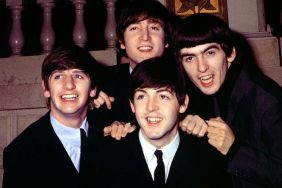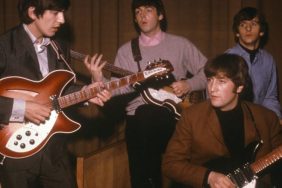Image Credit: Fotos International / Getty Images
It would have been John Lennon’s 75th birthday today. As such, the Internet is falling over itself to wish Happy Birthday to a man who, your own spiritual inclinations aside, probably can’t see their outpourings of love. I mean, even if you do believe in Heaven, it’s very unlikely that they’ve got Wi-Fi access up there and so it’s therefore probable that he’s unable to discover he’s currently a trending topic on Twitter.
But as is seemingly the case with most people who we idolise and practically canonise following their passing, Lennon’s life is perhaps not one that should be as roundly celebrated as it is, because while as a musician he certainly did a whole lot to become a beloved part of British pop culture history, as a human he had faults that shouldn’t be avoided when discussing Lennon the man, and not Lennon the singer/songwriter/guitarist.
It is understandable why so many Lennon fans are quick to defend him given the musical legacy he left behind, his untimely passing, and a “peace and love” public persona which has rarely faced any opposition since his death. Like most deceased celebrities, Lennon’s reputation has been shielded by those who adored him when he was alive, and criticisms lobbed in his direction are generally met with the question: “What’s the point?”
But while bringing up Lennon’s quite glaring flaws as a human may seem unimportant given that he’s no longer with us, the same argument could be made against the memorials that take place on what would have been birthday, or on the anniversary of his death. The “point” is that it is important, at least in my mind, to not encourage generation after generation to kneel at the altar of a celebrity who was guilty of some horrible crimes and offences. Yes, I still consider myself a fan of Lennon’s creative output. I do own plenty of Beatles records on vinyl. But there is a lot of evidence, along with quotes from Lennon himself, to suggest to me that to continue to remember this man in such an exclusively positive light smacks of insincerity in the information age, where we can all quite easily look this shit up and, unless we’re choosing to keep our blinkers firmly fixed onto the sides of our heads, conclude that he may have co-written ‘A Day in the Life’ but in other aspects of his life, he was a bit of a dick.
Like most celebrity stories, Lennon’s controversies are wrapped up in a bundle of unconfirmed “sources” and hearsay, so let’s dive into what we actually know about the man from accounts from his family, and from Lennon himself.
Domestic violence

John Lennon and ex-wife Cynthia. (Image Credit: Evening Standard / Getty Images)
Chris Brown is (rightly) doomed to be forever haunted by his violent attack on Rihanna, yet John Lennon’s history of domestic violence has been in the public knowledge since the beginning of The Beatles’ career, and yet his indiscretions continue to be glossed over. Speaking in an interview with Playboy magazine in 1980, John Lennon addressed the lyrics of the song ‘Getting Better,’ saying: “It is a diary form of writing. All that “I used to be cruel to my woman, I beat her and kept her apart from the things that she loved” was me. I used to be cruel to my woman, and physically — any woman. I was a hitter. I couldn’t express myself and I hit. I fought men and I hit women. That is why I am always on about peace, you see. It is the most violent people who go for love and peace.” Lennon expressed remorse in the same interview, adding: “I am not a violent man who has learned not to be violent and regrets his violence. I will have to be a lot older before I can face in public how I treated women as a youngster.”
Despite him admitting to being violent towards the women he dated and married throughout his life, Lennon was never taken to task about his behavior, with this particular interview seeing the interviewer swiftly move onto the next topic after Lennon admits his history of domestic violence. The double-standard when it comes to remembering John Lennon was no more evident than when activists placed stickers bearing the words “This Man Beats Women” on Chris Brown’s records, with the stickers then being placed on Lennon’s records, too, and attracting a much more negative response.
His treatment of his son

John with his son Julian Lennon in 1968. (Image Credit: Keystone Features / Getty Images)
John’s first son Julian Lennon has often spoken about his father being absent throughout much of his life, and has referred to John as being an “aggressive” man. Speaking in an interview in 1998, Julian said: “I have to say that, from my point of view, I felt he was a hypocrite. Dad could talk about peace and love out loud to the world but he could never show it to the people who supposedly meant the most to him: his wife and son. How can you talk about peace and love and have a family in bits and pieces – no communication, adultery, divorce? You can’t do it, not if you’re being true and honest with yourself.”
Cynthia, Julian’s mother, described John’s comment that Julian was “born out of a bottle of whiskey on a Saturday night” as “very cruel” and “inhuman.” In 2011, Julian said of his upbringing: “Mum was more about love than Dad. He sang about it, he spoke about, but he never really gave it, at least not to me as his son.” Paul McCartney also said that Lennon deserved to be labeled a poor father.
“Sean is a planned child, and therein lies the difference,” John said in an interview when Julian was 17-years old, though he insisted: “I don’t love Julian any less as a child.”
Mocking the disabled
In Lennon’s era society on the whole was much more ignorant in regards to physical and mental disability, which doesn’t make the above video any less difficult to watch, but at least places it within the context of its time period.
However, comments he made in a 1971 Rolling Stone magazine interview were far more damning of his opinions on the disabled. he said: “Wherever we went on tour, like in Britain or wherever we went, there’s always a few seats laid aside for cripples and people in wheelchairs. Because we were famous, we were supposed to have people – sort of epileptics and whatever they are – in our dressing room all the time. We’re supposed to be good. But you wanted to be alone, and you don’t know what to say.
“They’re usually saying, “I’ve got your record” or they can’t speak or something. And they just want to touch… and it’s always the mother or the nurse pushing them on you. They would just say hello and go away, they’re pushing them on at you like you’re Christ or something, or as if there’s some aura about you which will rub off on them. It just got to be like that. We got very callous about it. It was just dreadful. You’d open up every night, and instead of seeing kids there you’d just see a row full of cripples on the front.
“When we were running through, it seemed like [we were] just surrounded by cripples and blind people all the time. And when we’d go through corridors, everybody would be – they’d be all touching us. It got horrifying.”
He almost killed a man for calling him a “queer”

The Beatles with former manager Brian Epstein. (Image Credit: Keystone / Getty Images)
Back before The Beatles’ popularity had shot into the stratosphere, they hired the services of Brian Epstein as their manager. Epstein was an “out” gay man (being gay was actually against the law in Britain until 1966), and according to former Beatles’ drummer Pete Best, he made a pass at each member of the Fab Four and took a particular liking to Lennon.
Rumours surfaced regarding a potential romantic relationship between Lennon and Epstein after the two jetted to Spain together shortly after Cynthia had given birth to Julian, due to Lennon leaving his then-wife to deal with the newborn by herself, an act which Lennon would later brand “selfish and cruel.” These rumours led to John allegedly being confronted by Bob Wooler, a friend of The Beatles and DJ at the Cavern Club, during Paul McCartney’s 21st birthday party, with Wooler saying: “Come on John, what really happened with you and Brian? Everybody knows anyway, so tell us.”
John, who later said “I was so high I didn’t realise what I was doing,” reportedly almost beat Wooler to death, with the DJ later saying: “I don’t know why he did it. I was booted in the face. I begged him to stop.
“Finally he was pulled off by other people at the party. I have been a friend of the Beatles for a long time. I have often compered shows where they have appeared. OI am terribly upset about this – physically as well as mentally.”
According to reports, Lennon was asked by Epstein to apologise to Wooler, but after he refused the manager sent a telegram to Wooler himself and signed it with Lennon’s name, attaching £200. Lennon allegedly justified his behavior following the fight by saying that Wooler had called him “a queer”.







